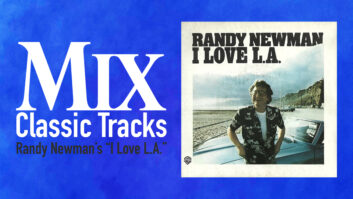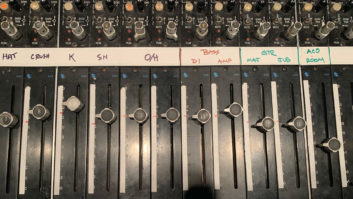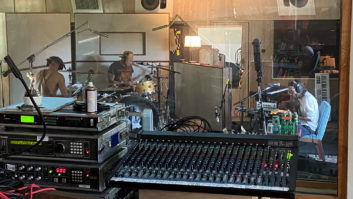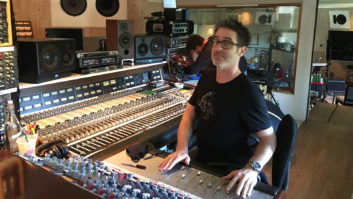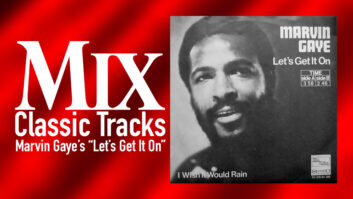
First, allow my informal interruption to give you a big thanks for your comments and reading the blog. My apologies for being away for December, and I have made it up to you by cooking up a super-bandwidth, high sampling rate, UN-DITHERED Blog!
I wish you all a very successful & fulfilling 2012.
Philosophy, The War, & The Love
Philosophy
Last month was mainly technical, so I’d like to focus this month on some things that are fundamental both to our philosophy and to our relationships with clients. I can, of course, only speak for Bernie Grundman Mastering and our general approach.
Mastering: We are speaking about the last creative step in the recording process. The fact is, you could actually call anything after mixdown as mastering, just as you could say that an iPhone in a bathroom is a studio. Hmm, that sounds like a nice reverb chamber….
When Bernie (my father) speaks about “what mastering is,” he will sometimes use phrases like “giving the listener a greater experience” or speak of tuning into the imbalances. But it’s unique from genre to genre, and yes, the client is integral to the end result. Getting to that end result is what most people are unsure of: the process. We really want to have a partnership between the artist and their vision.
There are times when clients send projects in with no instructions, just sort of “do what you do” requests, or even send in “shoot-outs” from major clients doing the “read our minds” game. To be fair, they may not know exactly what they want and just need a purely new and different approach.
I’ve even had mastering engineers write to me saying that their philosophy of mastering is “where the pumping happens.” It’s really interesting to see how different people have a view on what happens in mastering, even working engineers! So, you might think: 1) It’s “just slamming it and making it sound more detailed or compressed,” or 2) “high-end, audiophile quality and not so loud,” or some combo of competitively loud and more. Well, the highest honor a mastering engineer can really give you is “I really didn’t have to do anything.” So then, why come at all to a mastering studio? Oh grasshopper, read on. I’ll get to that in the third act.
The difference may be in how a person goes about thinking what will happen. I might have a client that comes in with something Rock or R&B and clearly has it in their mind to be blisteringly loud, but somewhere between the start and trying different approaches, we drop the level a little to get back more resolution and discover it might be better not to be in such a loudness search.
The War
We’re always hearing about “louder and louder.” Bernie has told me that this loudness war actually has always been around. I’ve been quoted saying it was in an era of the 90’s that it started to be really apparent, but no, that was just an exponential increase that happened. The loudness war has always been around.
Bernie remembers saying he had to buy a better stylus when the next record came out louder, to keep up with the volume competition. If you listen to old recordings, the distortion was there not just for effect but for loudness. These guys weren’t idiots and accidentally making the vocals distort because someone had too many highballs that afternoon. It’s always been there. Not everyone, of course, and yes, there might have been less destroying of music due to level back in the 50s , but you get the idea.
The Love
That being said , it really is about the relationship and getting into the artist’s intentions. Most of us know how hard it is to be “finished” with a record, so we take your work very seriously and humbly do our best to take care of your vision. I have heard of places that obliterate an artist’s hard work, but I can’t help but to think they weren’t trying to hurt them—they just had a certain way they went about “mastering.”
What if a mix comes in that is “perfect” and there’s very little to do? Well, that’s what we do, too. One mustn’t twist a knob just because we must. This is where I will cross over a little into next month’s subject matter, which has to do with mastering studio quality and home mastering or computer/plug-ins. Our system has its magic and that’s part of the ticket to ride. Sometimes our system is all that needs to be between your mixdown and finality, generally speaking. The rest is the engineer. Either can fail. Imagine how different a song can sound if you push certain characteristics out there or if the system loses signal in the transfer, eradicating the mixer’s many hours of tweaking? The possibilities are endless in how you could mess it up.
Going in with a sense of “being of service” to our clients is of paramount importance. I like to say “I’m always auditioning” for everything, and everyone.
Since it’s the season to be jolly, thankful, and giving, I’d like to thank all of you for being extra thoughtful to your clients, friends or family, to each other, and to your ears. Speaking of ears, next time we’ll speak about the use of mastering plug-ins (Shhh, it’s very quiet, and people are holding their breath). Yes, it might be the end of the world now in 2012? Are mastering plug-ins the sign of the apocalypse? (cue horror film string stabs)
Will we ever be obsolete? Tune in next time to find out.
